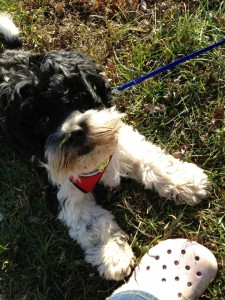“Practice curiosity or wonder as you interact with this neighbor… Practice being interruptible.” – The New Parish by Dwight J. Friesen, Paul Sparks, and Tim Soerens
 Alasdair, my pastoral care sidekick and general wonder-pup, came into my life in the fall of 2012. I’d moved back to Boston after three years at seminary and all of my friends had moved away from the city in those years I’d been gone. I got Alasdair for the companionship he’d provide, but had no idea that he’d also introduce me to the neighborhood I’d been living in for the past 6 months.
Alasdair, my pastoral care sidekick and general wonder-pup, came into my life in the fall of 2012. I’d moved back to Boston after three years at seminary and all of my friends had moved away from the city in those years I’d been gone. I got Alasdair for the companionship he’d provide, but had no idea that he’d also introduce me to the neighborhood I’d been living in for the past 6 months.
There is something about a dog that makes you approachable. All of a sudden I was meeting my neighbors. They would stop us during our walks first to pet Alasdair, and then to ask questions about where we lived, what I did, and so on. In 6 months of living in that neighborhood alone, no one had ever talked to me when I was out for a walk. I might get a polite nod if the person weren’t engrossed in their smart phone, but it was rare. We have become a population of people who are too busy to say hello. We are no longer curious about the stories we could learn simply by looking each other in the eye.
I am reading a book called The New Parish, about the idea of getting back to the organization of neighborhood parishes. The authors looked at the fact that since transportation became a “given,” people are able to engage in faith communities as consumers. If the “product” the local faith community is “selling” doesn’t meet one’s expectations they can go elsewhere. Christianity has moved from a community religion to one of personal relationship. When we start thinking of our faith exclusively as an individual venture we no longer have need of companions on the journey and we become insulated from the very human experience that God entered into in the form of Jesus.
It is in relationship that we learn about ourselves and the world around us. We become less selfish and more aware when we take a moment to step outside of ourselves long enough to see the world through the experience of another. We learn cooperation and collaboration when we are forced to live in long-term relationship with others: in good times and bad. Staying in relationship, even when it is hard, helps us to grow into the likeness of Christ. We cannot be in relationship if we allow our busyness to rule the day, preventing us from engaging with others on the journey of life with us. In this day and age when we are being pulled in every direction and told all the things we need to accomplish to be viewed as valuable we don’t have time to say hello to our neighbors – but those are the relationships which empower change. How could our lives, and the lives of those around us, improve if we “practice[d] being interruptible?”
 I have recently restarted running after some time off for a nagging injury and persuasive laziness. When I started running three years ago it was something of which I didn’t think I was capable. I got up every morning at 5:30 to pound out a few miles. I had a very specific playlist of motivational songs with the perfect beat to encourage my pace at a healthy rate that was neither too fast nor too slow. I could not run without those headphones, it would be impossible. I passed numerous strangers on the bike path each day, never saying hello to a single one. As I restart my practice I’ve learned to run without music which not only allows me to hear the sounds of the city and the voice of God, it meant I could hear when Ed, my 94 year old neighbor, shouted “Way to go!” as I trotted by this morning. I stopped to give him a smile and return the greeting before setting off again, and my day is better for it.
I have recently restarted running after some time off for a nagging injury and persuasive laziness. When I started running three years ago it was something of which I didn’t think I was capable. I got up every morning at 5:30 to pound out a few miles. I had a very specific playlist of motivational songs with the perfect beat to encourage my pace at a healthy rate that was neither too fast nor too slow. I could not run without those headphones, it would be impossible. I passed numerous strangers on the bike path each day, never saying hello to a single one. As I restart my practice I’ve learned to run without music which not only allows me to hear the sounds of the city and the voice of God, it meant I could hear when Ed, my 94 year old neighbor, shouted “Way to go!” as I trotted by this morning. I stopped to give him a smile and return the greeting before setting off again, and my day is better for it.
Leave a Reply
You must be logged in to post a comment.